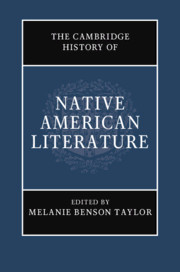Book contents
- The Cambridge History of Native American Literature
- The Cambridge History of Native American Literature
- Copyright page
- Contents
- Figures
- Contributors
- Introduction: What Was Native American Literature?
- Part I Traces and Removals (Pre-1870s)
- Part II Assimilation and Modernity (1879–1967)
- Part III Native American Renaissance (Post-1960s)
- Part IV Visions and Revisions: 21st-Century Prospects
- 23 Native American Horror, Fantasy, and Speculative Fiction
- 24 Charting Comparative Indigenous Traditions
- 25 The Global Correspondence of Native American Literatures
- 26 Indigenizing the Internet
- 27 Indigenous Futures beyond the Sovereignty Debate
- 28 The Leftovers
- 29 Can You See the Indian?
- Index
- References
27 - Indigenous Futures beyond the Sovereignty Debate
from Part IV - Visions and Revisions: 21st-Century Prospects
Published online by Cambridge University Press: 18 September 2020
- The Cambridge History of Native American Literature
- The Cambridge History of Native American Literature
- Copyright page
- Contents
- Figures
- Contributors
- Introduction: What Was Native American Literature?
- Part I Traces and Removals (Pre-1870s)
- Part II Assimilation and Modernity (1879–1967)
- Part III Native American Renaissance (Post-1960s)
- Part IV Visions and Revisions: 21st-Century Prospects
- 23 Native American Horror, Fantasy, and Speculative Fiction
- 24 Charting Comparative Indigenous Traditions
- 25 The Global Correspondence of Native American Literatures
- 26 Indigenizing the Internet
- 27 Indigenous Futures beyond the Sovereignty Debate
- 28 The Leftovers
- 29 Can You See the Indian?
- Index
- References
Summary
In charting how sovereignty has been defined in Indigenous literary studies, this chapter outlines some of the recent debates around the political and cultural meanings of the term. Through close readings of recent poems by Layli Long Soldier and Leanne Betasamosake Simpson, this chapter further argues that resurgent Indigenous futures depend upon relationalities that resist state models of political sovereignty.
- Type
- Chapter
- Information
- The Cambridge History of Native American Literature , pp. 501 - 518Publisher: Cambridge University PressPrint publication year: 2020
References
- 7
- Cited by

